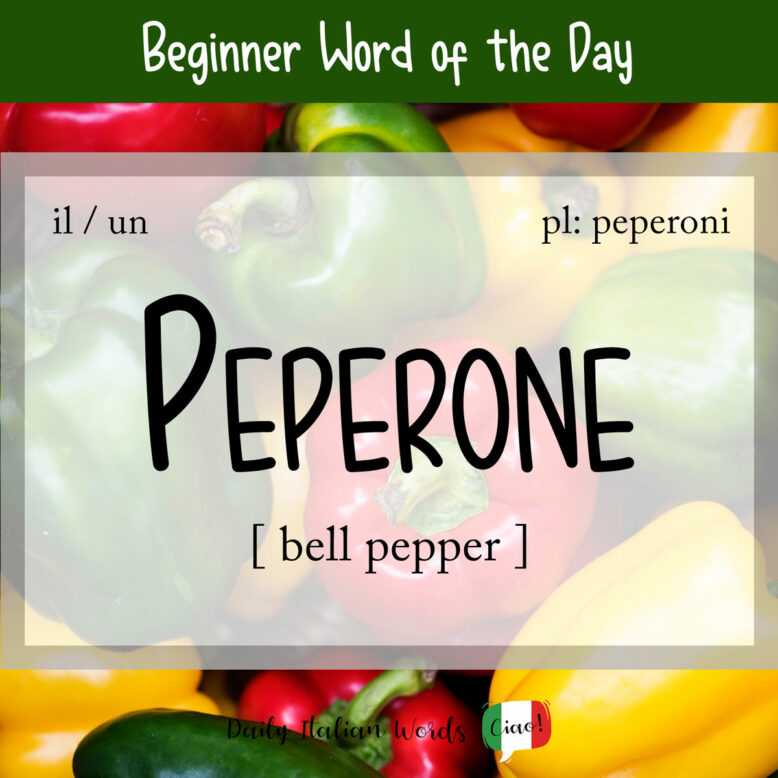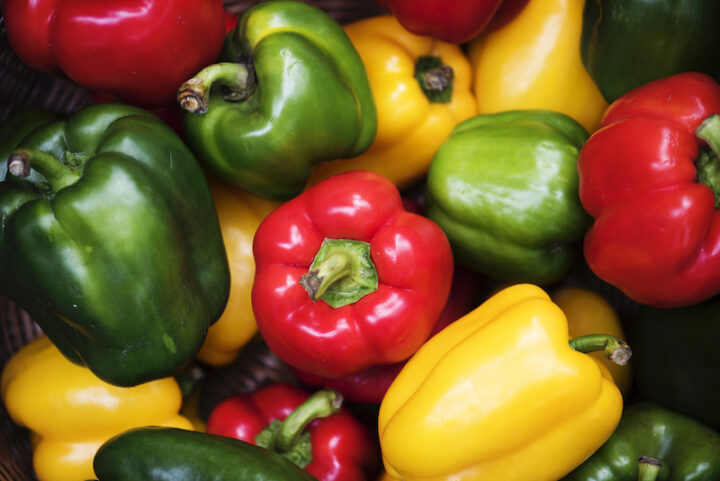The word for a pepper in Italian is peperone (masculine, plural: peperoni). Despite most frequently being used to describe the bell pepper (otherwise known as the sweet pepper), it can denote almost any pepper in the Capsicum annuum family.
The word derives from the Latin piper which actually denotes the condiment pepper rather than the fruit.

In addition to being the name of the fruit, peperone is also the name of the capsicum plant that bears it.
Important: The English word pepperoni, as in the pizza topping, is called salame piccante (spicy salami) in Italian but it derives from the word peperone. Don’t make the mistake of ordering a pizza ai peperoni in Italy, unless you actually do want peppers as your topping!
Peperoni can normally be bought in four colour variations:
- peperone rosso = red pepper
- peperone verde = green pepper
- peperone giallo = yellow pepper
- peperone arancione = orange pepper

Se vai al mercato, puoi prendere dei peperoni? – Sì certo. Quanti ne vuoi? – Hmm vediamo, un paio di peperoni verdi, uno rosso, e magari due gialli.
If you go to the market, can you get some bell peppers? – Yes, of course. How many do you want? – Hmm, let me see, a few green peppers, one red one, and maybe two yellow ones.
They come in various shapes (forme), sizes (dimensioni) and textures (consistenze), and have either a bitter or sweet taste (gusto amaro o dolce).
What we call a chilli in English is known as a peperoncino in Italian – literally a small pepper.
Mi puoi passare il peperoncino per favore? Grazie.
Can you pass me the chilli please? Thank you.
In Italy, some popular peperoni dishes include:
- peperoni in padella = pan-fried peppers
- peperoni con pomodoro = peppers with tomato
- peperoni al forno = oven-baked peppers
- peperoni alla brace = grilled peppers
- insalata di peperoni = pepper salad
- contorno di peperoni = side dish of peppers
- peperoni sott’aceto = pickled peppers
- peperoni sott’olio = peppers in oil
- peperoni ripieni = stuffed peppers
Did you know that…?
Green peppers are in fact the unripe version of red, yellow or orange peppers. Harvested in advance, they are characterised by a pungent and slightly acidic taste.
Expressions featuring ‘peperone’
Diventare rosso come un peperone
Literal translation: To become as red as a pepper
English meaning: To turn as red as a beet
Avere il naso come un peperone
Literal translation: To have a nose like a pepper
English meaning: To have a big red bulbous nose
Heather Broster is a graduate with honours in linguistics from the University of Western Ontario. She is an aspiring polyglot, proficient in English and Italian, as well as Japanese, Welsh, and French to varying degrees of fluency. Originally from Toronto, Heather has resided in various countries, notably Italy for a period of six years. Her primary focus lies in the fields of language acquisition, education, and bilingual instruction.


